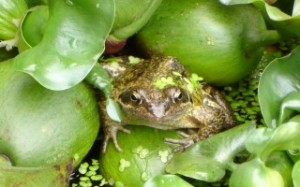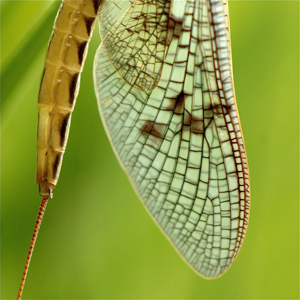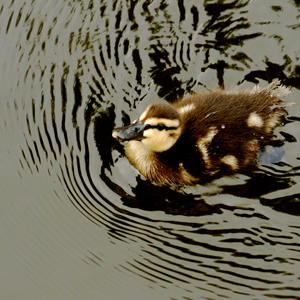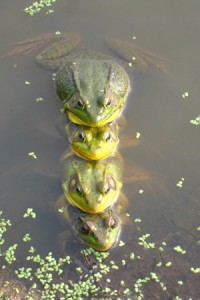Protecting the Planet – Ponderings from the Folks at Canadianpond.ca
 Like any situation where there is imbalance in the environment, isolating one component from another just doesn’t make sense. So when clients contact us with concerns about persistent algae problems after enjoying three decades of wonderful pond water quality, we bring them to a greater understanding about the connections of everything: the watershed of their pond, the bio-accumulation over time of nutrient rich sediment in their ponds, rain from more severe and frequent summer storms which may add particulates to their water, warmer and longer summer seasons from global warming that create the perfect circumstance in which algae blooms and invasive plants can thrive.
Like any situation where there is imbalance in the environment, isolating one component from another just doesn’t make sense. So when clients contact us with concerns about persistent algae problems after enjoying three decades of wonderful pond water quality, we bring them to a greater understanding about the connections of everything: the watershed of their pond, the bio-accumulation over time of nutrient rich sediment in their ponds, rain from more severe and frequent summer storms which may add particulates to their water, warmer and longer summer seasons from global warming that create the perfect circumstance in which algae blooms and invasive plants can thrive.
So the adage “Think Globally act Locally” really makes sense. Here is what we suggest for our trusted pond owners and clients who really want to make a difference in their actions to improve the environment, from the Planet to the Pond.
 Make slight changes to how you travel, heat your home, shop, eat, work, play etc. This is an effective way to reduce harm to the planet. If you fly a lot for business, try coordinating one electronic meeting for every 5 you must attend in person. If you drive a lot, car share, stay in town one night per week, move closer to your work, take a bus once per week. Heat less by replacing leaky windows, turn the thermostat down 1-2 degrees, wear slippers and a sweater, and put curtains in your windows. Shop locally when you can. Stock up on special items that are from further afield. Try putting in a garden and expand it every year.
Make slight changes to how you travel, heat your home, shop, eat, work, play etc. This is an effective way to reduce harm to the planet. If you fly a lot for business, try coordinating one electronic meeting for every 5 you must attend in person. If you drive a lot, car share, stay in town one night per week, move closer to your work, take a bus once per week. Heat less by replacing leaky windows, turn the thermostat down 1-2 degrees, wear slippers and a sweater, and put curtains in your windows. Shop locally when you can. Stock up on special items that are from further afield. Try putting in a garden and expand it every year.
Plant a fruit tree or small orchard. Purchase food grown locally and support local farmers, co-ops, and meat and dairy producers. The quality is better, the food is fresher and it hasn’t travelled thousands of kilometres to get to your plate. Freeze and can food for the winter, like generations before did, you’ll be less dependent on external costs (rise in oil prices for example) and have fun doing it. Work closer to home if possible, or try to work 4 – 10 hour days so you commute 1 day less per week. And if you set about making changes, don’t forget to brag about them…to inspire others to follow suit. From Chaos Theory we know that even the smallest of changes make a difference in time and space.
Help improve the watershed in your neighborhood. The watershed is surface flow of water that moves with gravity through the landscape, and it is likely your pond is part of a surface watershed, if not an underground aquifer. Plant trees whenever possible, they are the great equalizers of our times, trees protect streams, rivers and lakes from sun, heat, surface run-off. Use plants, landscaping and planted berms to slow down the movement of surface run-off, so it erodes less, travels more slowly, absorbs more gently into the earth. Investigate the possibilities of watershed management and volunteer your time to get some projects started. Encourage your municipality to hire a watershed management specialist to evaluate your regional watersheds and make practical changes to improve water flow through your community.
Around your pond, to protect the water, plant indigenous aquatic plants in the water and along the shoreline so that nutrient rich surface water is better absorbed. Be sure to let the grass grow within a minimum band of 5 m. from the shoreline. Do  not use fertilizers (natural or synthetic) within the watershed of your pond if possible, especially avoid fertilizing your lawn. Use your pond a lot, for swimming, boating, exercising the dog etc. this will help aerate the pond by creating movement, breaking surface tension, and mixing the layers.
not use fertilizers (natural or synthetic) within the watershed of your pond if possible, especially avoid fertilizing your lawn. Use your pond a lot, for swimming, boating, exercising the dog etc. this will help aerate the pond by creating movement, breaking surface tension, and mixing the layers.
Come to us for ecological solutions to help your troubled pond. Our beneficial bacteria can consume accumulated, nutrient rich sludge that contribute to algae blooms, and overall poor water quality. Our aeration systems add oxygen at the sediment level where the bacteria consume the sludge, since most bacteria need aeration; these systems are very effective at improving water quality. Our floating islands provide shade, habitat and extensive root systems where bacteria thrive. Over the years we have seen what works, what does not work and what takes time and patience. When we can we chose an ecological approach to water management using plants, oxygen, and nature’s beneficial bacteria to help undo the damage caused by our modern systems, we go that route first.
Have fun with these big and little changes, the planet and the pond will thank you in their own way!